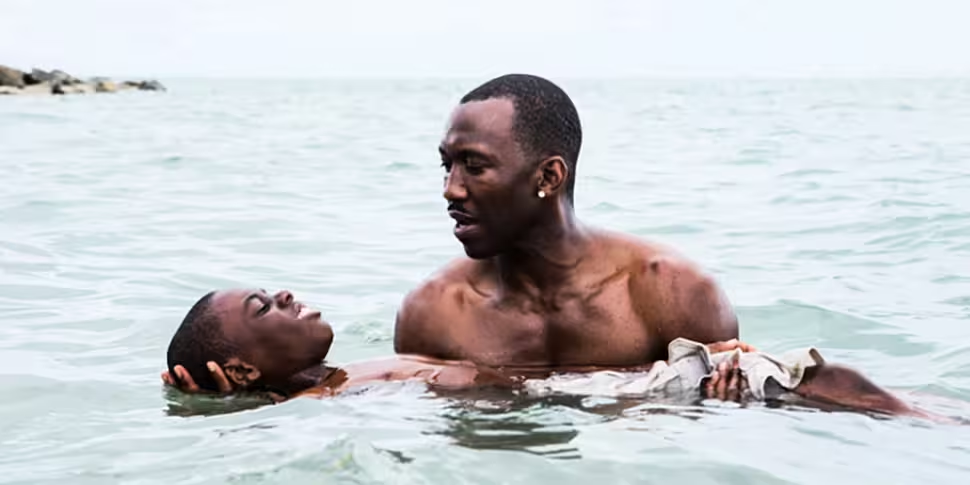Barry Jenkins’ Moonlight quietly defies every expectation an audience member might have about a film set in an African-American community plagued and buoyed in equal measure by the sale of drugs. Told in three chapters, the film follows the life of Chiron, also called Little, has he grows from bully-fleeing child to troubled adolescence and imposing man.
Little is not the only nickname that follows him through life. Saved from the classmates terrorising him, child Chiron (Alex Hibbert) finds an unlikely foster family in Juan (Mahershala Ali), a crack dealer who sees him tearing through the streets, finding shelter in an abandoned apartment building. Taking him home to his girlfriend Teresa (Janelle Monáe, whose work here and in Hidden Figures establishes her as a movie in the making), the pair takes care of the buttoned-up boy, feeding him and patiently encouraging him to speak.

Ashton Sanders as the teenage Chiron [A24]
Finding a family
When Chiron eventually – after repeated moments of respite from his wrathful crack-smoking mother Paula (Naomie Harris) – asks them what a faggot is and whether he is one, it’s an emotional gut punch. Teresa and Juan share a glance. No one wants to skirt around the truth, everyone already assumes the inescapable loneliness that hangs heavy on his eight-year-old shoulders cannot be lifted with lies, little white or other. As Chiron begins to connect the dots, not just about his nascent sexuality, the burden of another truth looks set to blow apart the only good thing in his life.
Skipping forward a number of years, and Chiron, now a scrawny teenager, seems even sadder than before. Now played by Ashton Sanders, a brilliant physical performance who wears every emotion on every part of him, Chiron endures the menacing threat of a schoolyard bully. With his mother now addicted to crack, further complications emerge when a friend, Kevin (Jharrel Jerome), arrives at the beach where Chiron is watching the waves at night. They share a blunt, then a kiss, before fumbling through a low-key sexual awakening somehow as intimate as it is awkward. But the only constant in Chiron’s life is betrayal, and now, no longer a boy but not yet a man, an attempt to seize control the only way he can offers immediate satisfaction but long-term trouble.
Part three sees Chiron all grown up – and filled out. Now played by Trevante Rhodes, Chiron is a drug dealer living outside of Atlanta. No longer Little, he goes by Black, a name given to him by Kevin as a teenager. Answering the phone during the middle of the night, expecting another call from his mother, he’s surprised to find it’s Kevin on the other end of the line, asking him to pay him a visit at the restaurant he works in back in Florida.
Intimate and distant
Based on the semi-autobiographical play In Moonlight Black Boys Look Blue by Tarell Alvin McCraney, Moonlight is both intimate and distant. Across the board, the performances by the entirely African-American cast feel fully realised and true to life, though the unfamiliarity of an Irish audience to that life can create some barriers.
In its three Chirons, each unknown newcomers who look nothing alike physically, Jenkins has found actors who weave together three parts of a man’s life seamlessly, each performance building on the last but standing on its own. Naomie Harris, utterly wasted as Moneypenny to Daniel Craig’s 007, is as hateful as she is pitiable as Paula, whose drug use seems entirely fuelled by a need to escape responsibility.
Mahershala Ali, the frontrunner for the ‘Best Supporting Actor’ Oscar, shows us (frustratingly briefly) something we have never seen before in a black drug dealer on screen. He isn’t violent, though you know he could be, nor does he take Chiron under his wing to groom him into his cap-popping protégé. Instead, he cradles the boy in his arms in the sea as he teaches him to float in the ocean, providing men of all races an image of how to deal with a son who might be gay.
James Laxton’s dizzying cinematography and Joi McMillon and Nat Sanders’ excellent editing knit together a visually arresting film that belies its minuscule $5m budget.
And yet, each of the stories feels unfinished, worthy of its own single feature. The strongest, Part II, seems like an opportunity wasted, while the weakest, Part III, seems too neat and somewhat out of sorts with what’s preceded. By the end, you may not know much more about what it means to be black and gay in modern America, but Moonlight’s subtle ebb and flow of Chiron’s emotions still makes for compelling filmmaking.
Verdict: A visual richness papers over some of the patchiness of the script, but this is bold and honest cinema.
Moonlight (15A/111mins) gets a limited release today and comes out nationwide on Feb 17th.









